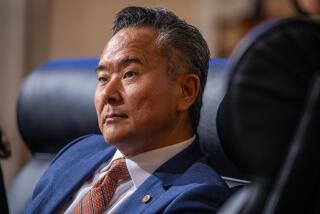Ex-Oracle Lobbyist Refuses to Testify as Panel Ends Probe of Software Deal
- Share via
SACRAMENTO — Oracle lobbyist Ravi Mehta refused to testify at a legislative hearing Thursday about his role in the state’s $95-million software contract with the company, invoking his right to avoid self-incrimination.
At that, Assemblyman Dean Florez (D-Shafter), chairman of the Joint Legislative Audit Committee, declared the panel’s investigation to be over and announced that its massive collection of evidence and testimony will be sent to Atty. Gen. Bill Lockyer for his criminal investigation of the deal.
Mehta appeared under subpoena Thursday after failing to attend Wednesday and testify voluntarily as he had said he would. His attorney, former federal prosecutor Matt Jacobs of Sacramento, called the committee’s proceedings a “Star Chamber” affair in which his client would not receive a fair hearing.
As Jacobs sat beside him at the witness table Thursday, Mehta again refused to testify, even after he had been given half an hour to read a preview of the more than 160 questions Florez intended to ask. Many dealt with a $25,000 check he handed to one of Davis’ top information technology advisors shortly after the contract was signed in May 2001. Davis later returned the contribution, but the staff member, Arun Baheti, resigned under pressure.
Florez said he also wanted to ask about a memo Mehta wrote last January to Oracle executives urging them to make campaign contributions to a group of legislators who had been “helpful” to Oracle in the past or who may become friends of the company in the future. Oracle officials said they dismissed the memo and did not make the contributions.
Mehta, an attorney and former chairman of the state Fair Political Practices Commission, which enforces political reform laws, told committee members that he had cooperated in providing documents to the panel and “I’d like to continue cooperating.”
But, as committee members had anticipated, Mehta then asserted his 5th Amendment constitutional right against self-incrimination as well as all other “applicable” laws, including his right to privacy and “my right not to have this committee inquire into matters beyond its jurisdiction.”
Florez excused him as a witness. He said that if the committee compelled Mehta to answer even the most innocuous question, the action likely would have the effect of granting Mehta immunity against possible criminal charges. It also risked jeopardizing the attorney general’s investigation, he said. Mehta, whose employment with Oracle terminated May 31, and Jacobs refused to talk with reporters.
Nathan Barankin, a spokesman for Lockyer, turned aside questions about the attorney general’s investigation but expressed relief that the committee’s investigation was now concluded.
Barankin indicated that the committee’s probe, which reached into Davis’ office and took testimony from top gubernatorial staffers, tended to compete with Lockyer’s inquiry. The attorney general’s investigators will now have “more flexibility” in interviewing people and gathering evidence, he said.
Lockyer himself accepted $50,000 in contributions from Oracle in 2000 and 2001. He returned the funds recently when the Oracle scandal broke, Barankin said.






